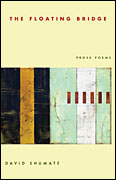
|
At some point nearly all the modern masters have tried the prose poem on for size, feeling out the form's possibilities and limitations, allowing the prose construction to compliment and diversify their voices. Not many, however, have attempted to make the prose poem their entire record, or even the exception to the norm. David Shumate, whose earlier book High Water Mark won the Agnes Lynch Starrett Poetry Prize in 2003, is doing just that with The Floating Bridge, his follow-up and a second collection of prose poems. At their best Shumate's prose poems offer taut, timeless parables whose morals prove complex without loss of clarity, perhaps because of the soothing precision of his voice. “The Yellow Bird” begins with a simple narrative, told in simple terms: “It is February. The days are frigid and short and my lover is far away.” Then the poem bursts, and amidst his overwhelming sense of loneliness the speaker begins to wander the town, the marketplace. Finally, he takes a carriage to the park and sees “a yellow bird crazy with love chasing its mate through the naked trees,” which makes him “ask the driver if he knows its name.” Of course, the bird doesn't cure the speaker's loss, but it makes him feel less lonely for a while, which you imagine must have made him smile at least. Another poem, “The Long Road,” constructs a detailed, pitch-perfect metaphor for the uncertainty of our lives: “It's one of those highways you come across late at night. No signs. No arrows. Just a road running north and south. You pause.” And what to do, then, but try to make sense of the darkness while you stand helpless among it? the poem suggests. After all, it's all we know: “Perhaps you see a mountain. An ocean. A lover you wish you hadn't lost….It may be years before it is safe to proceed.” It may be years, but Shumate leaves little doubt that you'll get moving again. Finally, humor and lightheartedness define much of The Floating Bridge. “An American in Paris ” emphasizes the beauty and comfort of the imagination: “Carol would like to go to Paris , but doesn't want to bother with the long flight.” Don't worry. Thanks to Shumate, Carol's going to make the trip. He writes her into the streets, decked out in local fashions, enjoying local cuisine. And he can't resist writing in a bathtub scene either, just for kicks: “Won't she be surprised when she turns the water off and finds herself so far away with only a towel to wrap around her?” Sure, Carol is surprised. But we aren't. We've come to expect such things from Shumate by now. --Jay Robinson
|
